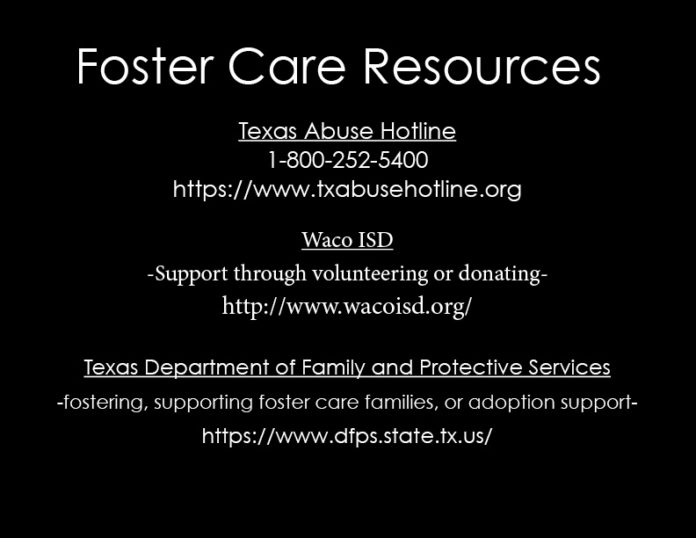By Molly Atchison | Print Managing Editor
In low-income communities, the risk of losing students due to movements within the foster system is a concern for many educators.
According to the Department of Family and Protective Services, in McLennan County alone, 199 children under the age of 17 are in the foster system as of Sept. 2017. With the City of Waco reporting nearly 53,740 students in McLennan County’s education system in 2016, the DFPS numbers may seem insignificant. But in reality, these statistics indicate a correlation between home transience and educational success.
According to the U.S. Department of Health and Human Services’ Adoption and Foster Care Analysis Reporting System (AFCARS), a child in the foster care system will spend an average of 19 months in the system before exiting into another care facility.These facilities can include the home of a relative, a long-term foster family, a group home or supervised independent living. However, this does not mean they have found a permanent home, this simply means they have been placed somewhere meant to be a sustainable living environment.
Children in foster care average 2.8 different living arrangements, or placements during their first foster care stay, according to National Work Group research. This means that a foster care child will spend an average of one and a half years in foster care before being placed into a home. Within this time, they can change living arrangements more than twice, and are forced to change schools accordingly.
In Waco, education is an area of concern already. According to the comprehensive biannual Texas Education Agency report on academic standards, six Waco schools have received a “needs improvement” status from the state, and five are in imminent danger of closing because of consistently not meeting standards. With so many schools already underfunded and underperforming, those 199 Waco foster care children are at an even higher risk of being undereducated.
With a school system in the midst of reform, students in Waco are already experiencing difficulties in their educational lives, as well as at home. Baylor education majors learn to work with students from varying backgrounds and different experiences by assisting in Waco classrooms.
Phoenix junior Anna McFarland and Katy junior Abby Graeflin are elementary education majors who spent the semester working in Waco schools, where they have learned to address students with different backgrounds.
“We take certain classes that incorporate child development and teach us about certain symptoms that we have to look for,” Graeflin said. “We have always been taught to create relationships with all of the children so we notices those types of symptoms … we also try to create relationships with the parents so we can let them know what is happening.”
McFarland worked in a third grade classroom with a variety of different students, some with advanced learning levels and some who would qualify for special education programs. With such a wide range of educational development, students with emotional or mental issues stemming from abuse or neglect can fly under the radar if the teacher isn’t prepared.
“In some disciplinary programs, we have a ‘safe space’ in a corner of the room,” McFarland said. “It’s a place for the kids to either compose themselves or just step away from the stress of the class. I’ve had an emotional girl this semester who’s cried a couple of times, and I ask her if she wants to go to the safe space. She nods, and then will come back to participate after breathing and composing herself a bit … It’s all about the choices the kids make. I believe they are in control of their actions when they walk in the classroom and I will do my best to support them academically, but no matter their background, students thrive in a community of high expectations.”
Many schools across the country implement the idea of “alternative punishment” to avoid a negative connotation with education and discipline. Places such as these “safe spaces” and meditation rooms are starting to make their way into schools, but however encouraging the academic environment may be, if their home life is in a state of turmoil, it adds a hurdle on their road to success.
A 2014 study from the U.S. Census Bureau on “The Impact of Family Structure, Mobility and Employment on a Child’s Well Being” indicated a strong negative correlation between familial structure changes and negative academic and familial engagement. This means that children who experience a change in their home life have a harder time engaging in academic activities. For children in the K-12 school system, this could mean a drop in grades, social deficits and acting out. For children without any parental guidance, or for those in foster families they don’t yet trust, this is especially important to avoid.
While foster care and education may not be at the forefront of Waco citizen’s minds, the turbulence of foster children’s lives and the lack of funding for Waco schools has larger implications on the quality of education students, especially those in the foster care in Waco are receiving.
If you know a child that is experiencing abuse or neglect, call the Texas Abuse Hotline at 1-800-252-5400, or visit their website.
If you are interested in volunteering time, donating money or supporting efforts in Waco ISD, visit their website for information about the ways you can get involved in your school district.
If you are interested in fostering, supporting foster care families, or adoption support, visit their website for more information.






